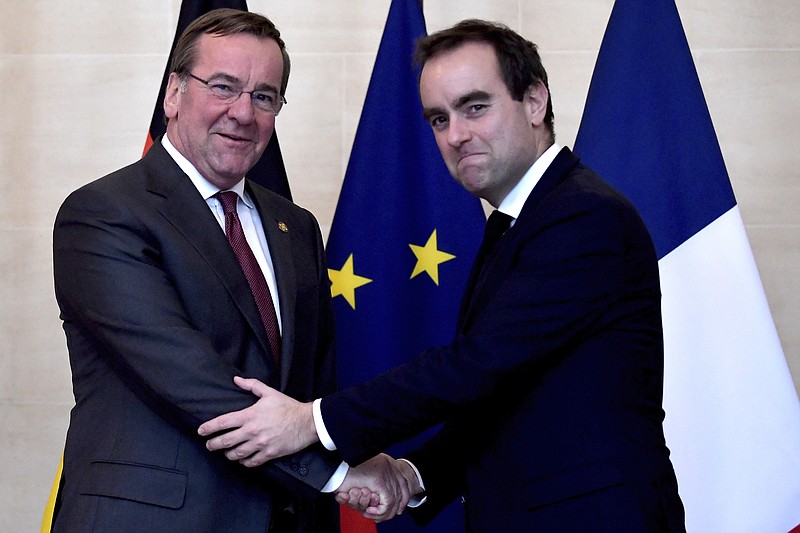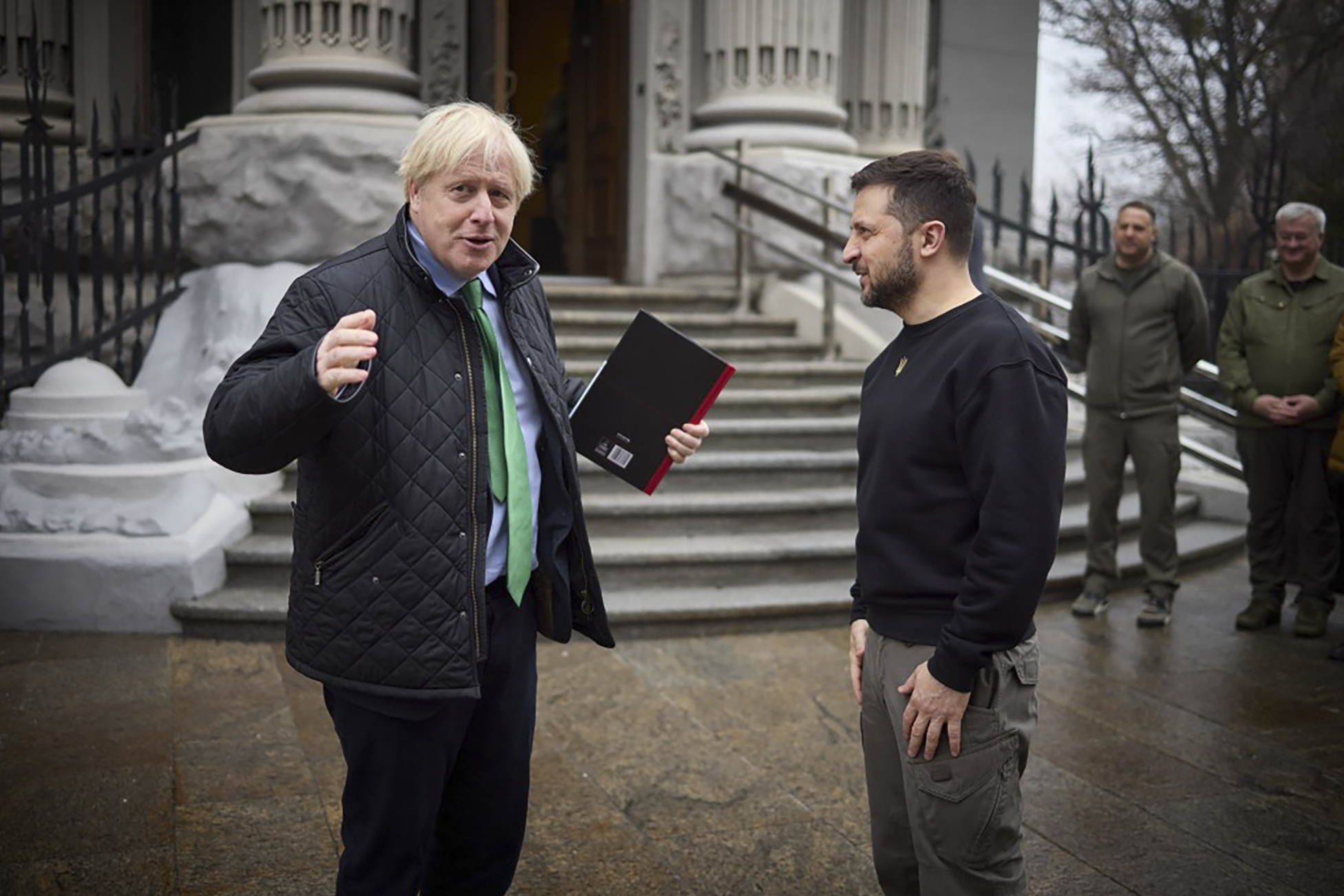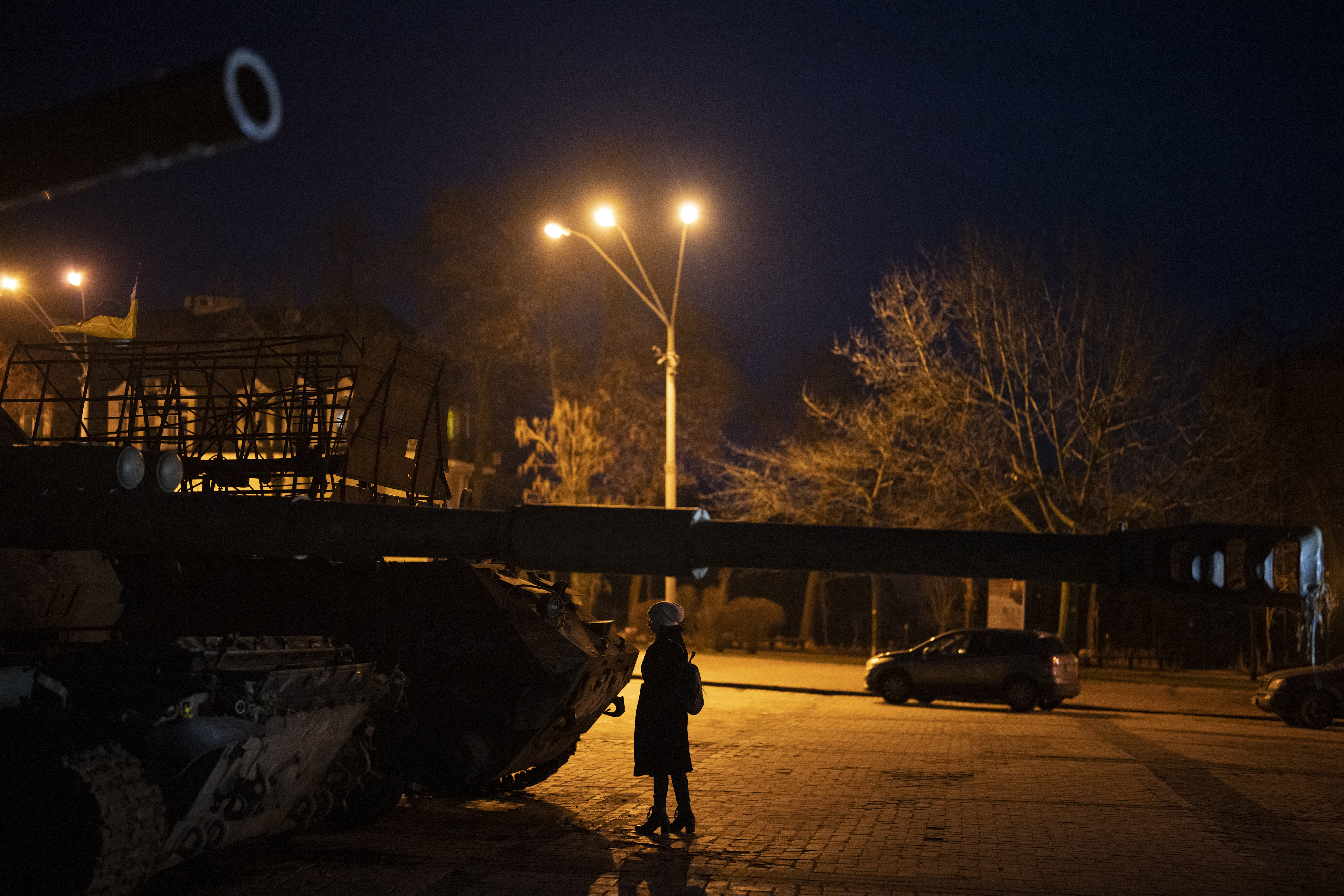KYIV, Ukraine -- The German government will not object if Poland decides to send Leopard 2 battle tanks to Ukraine, Germany's top diplomat said Sunday, indicating movement on supplying weapons that Kyiv has described as essential to its ability to fend off an intensified Russian offensive.
German Foreign Minister Annalena Baerbock told French TV channel LCI that Poland has not formally asked for Berlin's approval to share some of its German-made Leopards but added "if we were asked, we would not stand in the way."
German officials "know how important these tanks are" and "this is why we are discussing this now with our partners," Baerbock said in interview clips posted by LCI.
Ukraine's supporters pledged billions of dollars in military aid to Ukraine during a meeting at Ramstein Air Base in Germany on Friday. International defense leaders discussed Ukraine's urgent request for the Leopard 2 tanks, and the failure to work out an agreement overshadowed the new commitments.
Germany is one of the main donors of weapons to Ukraine, and it ordered a review of its Leopard 2 stocks in preparation for a possible green light. Nonetheless, the government in Berlin has shown caution at each step of increasing its military aid to Ukraine, a hesitancy seen as rooted in its history and political culture.
Germany's tentativeness has drawn criticism, particularly from Poland and the Baltic states, countries on NATO's eastern flank that feel especially threatened by Russia's renewed aggression.
Polish Prime Minister Mateusz Morawiecki said that if the fellow NATO and European Unio member did not consent to transferring Leopard tanks to Ukraine, his country was prepared to build a "smaller coalition" of countries that would send theirs anyway.
"Almost a year had passed since the outbreak of war," Morawiecki said in an interview with Polish state news agency PAP published Sunday. "Evidence of the Russian army's war crimes can be seen on television and on YouTube. What more does Germany need to open its eyes and start to act in line with the potential of the German state?"
The German government's entire Cabinet was in Paris for joint meetings with their French counterparts, and about 300 lawmakers from the two countries came together at Sorbonne University.
Speaking during a joint news conference with German Chancellor Olaf Scholz, French President Emmanuel Macron said he does not rule out sending Leclerc tanks to Ukraine and has asked his defense minister to "work on" the idea.
Scholz did not comment on whether Germany would agree to provide the Leopards, instead stressing what his country has already supplied.
"The U.S. is doing a lot. Germany is doing a lot, too," the chancellor said. "We have constantly expanded our deliveries with very effective weapons that are already available today. And we have always coordinated all these decisions closely with our important allies and friends."
In a joint declaration, the two countries said they "will continue to show unwavering support to Ukraine in all areas possible" and will "stand with Ukraine for as long as it takes."
France and Germany also pledged to "work together for a European Union that is more resilient, more sustainable and more capable to act independently." The treaty that sealed a bond between longtime enemies France and Germany 60 years ago underpinned today's EU.
"Let us use our inseparable friendship ... to shape the present and future of our continent, together with our European partners," Scholz said at the ceremony at the Sorbonne.
Scholz said Russian President Vladimir Putin's "imperialism will not win. ... We will not allow Europe to revert to a time when violence replaced politics and our continent was torn apart by hatred and national rivalries," he added.
Macron called for "a new energy model" in the EU based on diversifying supplies and encouraging carbon-free energy production.
In their joint declaration, Paris and Berlin committed to "stepping up our investments in the technologies of tomorrow, particularly renewable and low carbon energies." They especially committed to develop a "joint road map" on hydrogen.
They said a joint pipeline project by Spain, France and Portugal to transport green hydrogen -- produced from renewable sources is to be extended to Germany.
The so-called H2Med undersea pipeline from the Iberian peninsula to France is set to enter operation by 2030. It is expected to transport up to 2 million metric tons of green hydrogen a year, which amounts to 10% of the total European Union's consumption, according to Spanish authorities.
RUSSIAN DECRIES TRANSFERS
Earlier Sunday, the speaker of the lower house of Russia's parliament, State Duma Chairman Vyacheslav Volodin, said governments that give more powerful weapons to Ukraine risked causing a "global tragedy that would destroy their countries."
"Supplies of offensive weapons to the Kyiv regime would lead to a global catastrophe," Volodin said. "If Washington and NATO supply weapons that would be used for striking peaceful cities and making attempts to seize our territory as they threaten to do, it would trigger a retaliation with more powerful weapons."
Macron, meanwhile, said Sunday that he had asked his defense minister to "work on" the idea of sending some of France's Leclerc battle tanks to Ukraine.
Macron spoke during a news conference in Paris with Scholz as France and Germany commemorated the 60th anniversary of their post-World War II friendship treaty. The officials were marking the 60th anniversary of the Elysee Treaty signed by French President and wartime anti-Nazi resistance leader Charles de Gaulle and West German Chancellor Konrad Adenauer on Jan. 22, 1963.
In a joint declaration, the two countries committed to their "unwavering support" for Ukraine.
France will make its tank decision based on three criteria, Macron said: that sharing the equipment does not lead to an escalation of the conflict, that it would provide efficient and workable help when training time is taken into account, and that it wouldn't weaken France's own military.
Scholz did not respond when asked about the Leopard 2 tanks Sunday, but stressed that his country already has made sizable military contributions to Ukraine.
"The U.S. is doing a lot, Germany is doing a lot, too," he said. "We have constantly expanded our deliveries with very effective weapons that are already available today. And we have always coordinated all these decisions closely with our important allies and friends."
In Washington, two leading lawmakers urged the U.S. on Sunday to send some of its Abrams tanks to Ukraine in the interests of overcoming Germany's reluctance to share its own, more suitable tanks.
"If we announced we were giving an Abrams tank, just one, that would unleash" the flow of tanks from Germany, Rep. Michael McCaul, the Republican chairman of the House Foreign Affairs Committee, told ABC's "This Week on Sunday." "What I hear is that Germany's waiting on us to take the lead."
Sen. Chris Coons, a Democrat who is on the Senate Foreign Relations Committee, also spoke up for the U.S. sending Abrams.
"If it requires our sending some Abrams tanks in order to unlock getting the Leopard tanks from Germany, from Poland, from other allies, I would support that," Coons said.
Dmitry Medvedev, the deputy head of the Russian Security Council, said Friday's U.S.-led meeting at the air base in Germany "left no doubt that our enemies will try to exhaust or better destroy us," adding that "they have enough weapons" to achieve the purpose.
Medvedev, a former Russian president, warned that "in case of a protracted conflict," Russia could seek to form a military alliance with "the nations that are fed up with the Americans and a pack of their castrated dogs."
Ukraine has argued it needs more weapons as it anticipates Russia's forces launching a new offensive in the spring.
Oleksii Danilov, the secretary of Ukraine's Security and Defense Council, warned that Russia may try to intensify its attacks in the south and in the east and to cut supply channels of Western weapons, while conquering Kyiv "remains the main dream" in President Vladimir Putin's "fantasies," he said.
In a column published by online newspaper Ukrainska Pravda. he described the Kremlin's goal in the conflict as a "total and absolute genocide, a total war of destruction."
Among those calling for more arms for Ukraine was the former British prime minister, Boris Johnson, who made a surprise trip to Ukraine on Sunday. Johnson, who was pictured in the Kyiv region town of Borodyanka, said he traveled to Ukraine at the invitation of President Volodymyr Zelenskyy.
"This is the moment to double down and to give the Ukrainians all the tools they need to finish the job. The sooner Putin fails, the better for Ukraine and for the whole world," Johnson said in a statement.
The last week was especially tragic for Ukraine even by the standards of a brutal war that has gone on for nearly a year, killing tens of thousands of people, uprooting millions more and creating vast destruction of Ukrainian cities.
A barrage of Russian missiles struck an apartment complex in the southeastern city of Dnipro on Jan. 14, killing at least 45 civilians. On Wednesday, a government helicopter crashed into a building housing a kindergarten in a suburb of Kyiv. Ukraine's interior minister, other officials and a child on the ground were among the 14 people killed.
Zelenskyy vowed Sunday that Ukraine would ultimately prevail in the war.
"We are united because we are strong. We are strong because we are united," the Ukrainian leader said in a video address as he marked Ukraine Unity Day, which commemorates when east and west Ukraine were united in 1919.
Information for this article was contributed by Andrew Meldrum, Sylvie Corbet, Emily Schultheis, Angela Charlton, Frank Jordans and Raquel Redondo of The Associated Press.
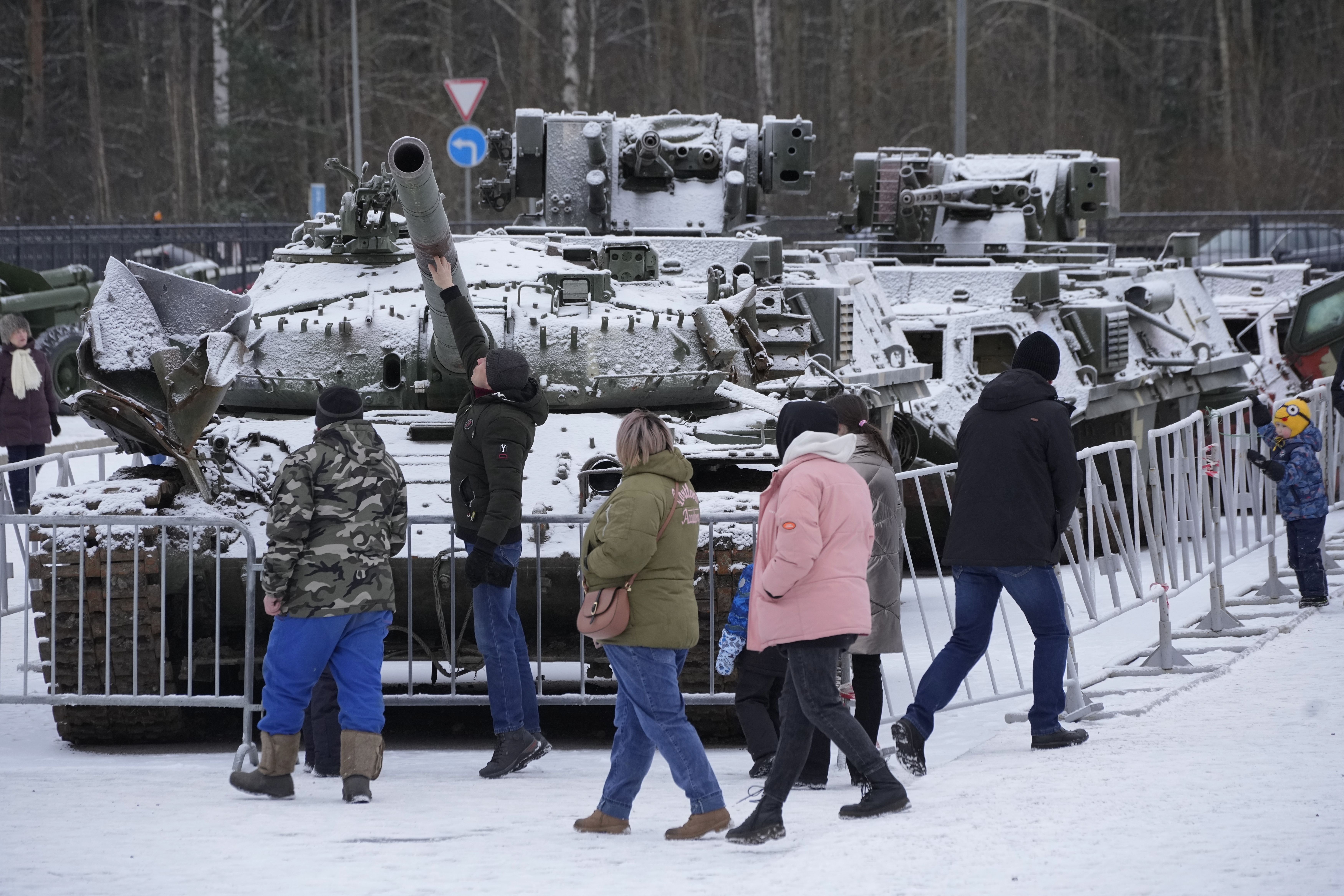 People visit an exhibition of tanks and APCs of Ukrainian armed forces damaged and captured during the fighting at an exhibition at the museum "Breakthrough of the Siege of Leningrad" in Kirovsk, about 30 kilometres (19 miles) east of St. Petersburg, Russia, Sunday, Jan. 22, 2023. (AP Photo/Dmitri Lovetsky)
People visit an exhibition of tanks and APCs of Ukrainian armed forces damaged and captured during the fighting at an exhibition at the museum "Breakthrough of the Siege of Leningrad" in Kirovsk, about 30 kilometres (19 miles) east of St. Petersburg, Russia, Sunday, Jan. 22, 2023. (AP Photo/Dmitri Lovetsky)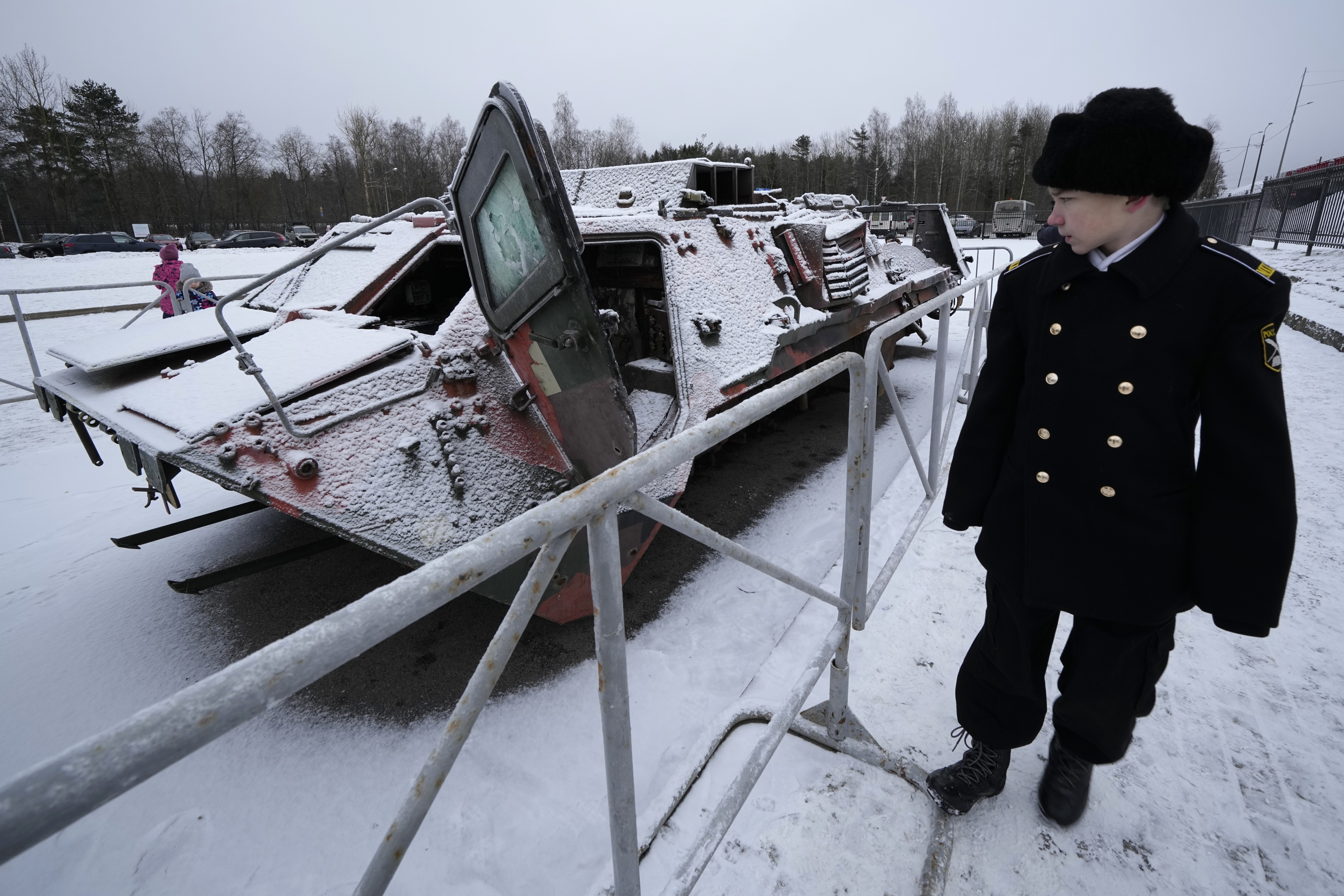 A student of navy military school visits an exhibition of tanks and APCs of Ukrainian armed forces damaged and captured during the fighting at an exhibition at the museum "Breakthrough of the Siege of Leningrad" in Kirovsk, about 30 kilometres (19 miles) east of St. Petersburg, Russia, Sunday, Jan. 22, 2023. (AP Photo/Dmitri Lovetsky)
A student of navy military school visits an exhibition of tanks and APCs of Ukrainian armed forces damaged and captured during the fighting at an exhibition at the museum "Breakthrough of the Siege of Leningrad" in Kirovsk, about 30 kilometres (19 miles) east of St. Petersburg, Russia, Sunday, Jan. 22, 2023. (AP Photo/Dmitri Lovetsky)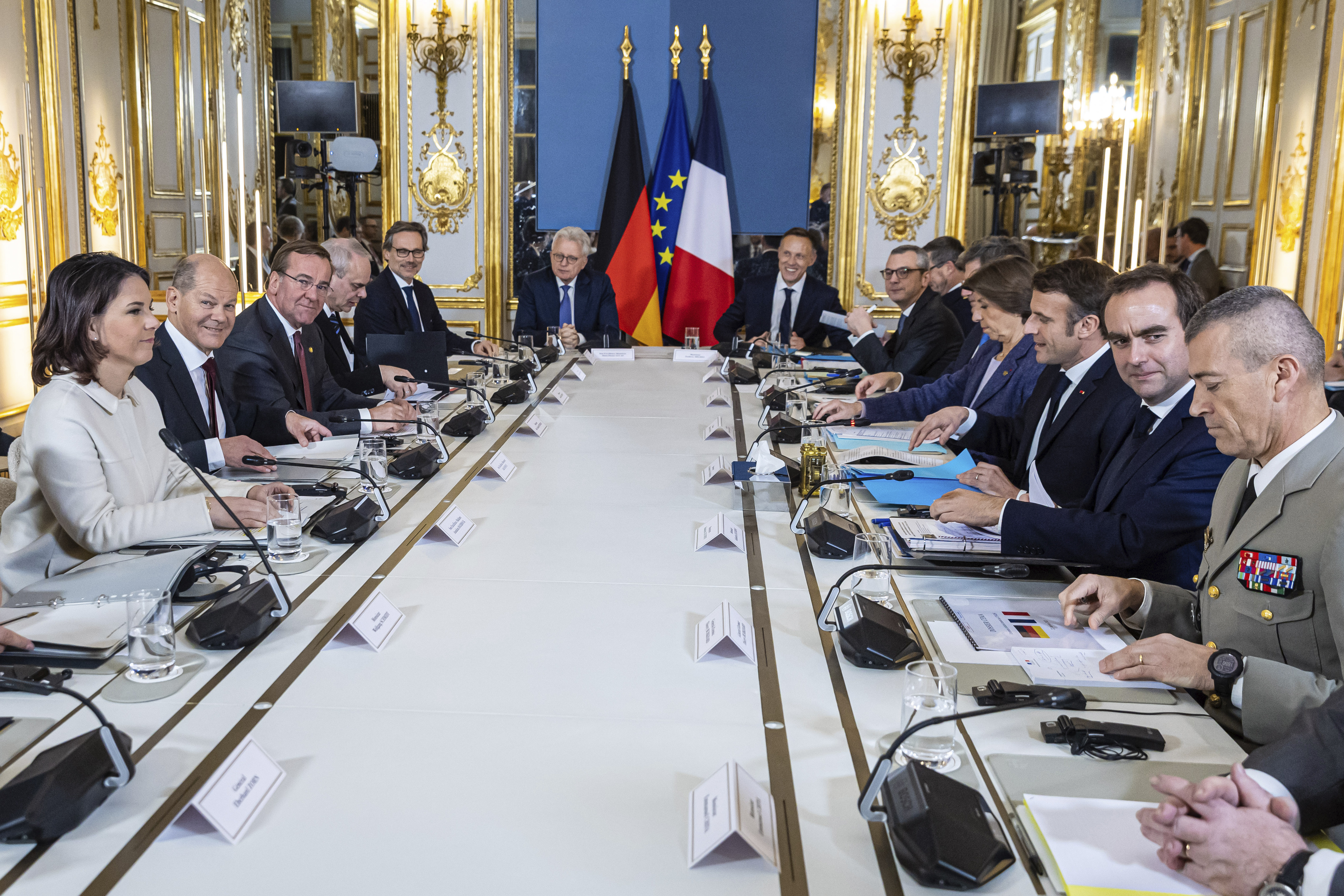 German Foreign Affairs Minister Annalena Baerbock, left, German Chancellor Olaf Scholz, second left, German Defense Minister Boris Pistorius, third left, French Defense Minister Sebastien Lecornu, second right, and French President Emmanuel Macron, third right, attend a Defense and Security joint council upon a Franco-German Ministers council as part of the 60th anniversary of the Elysee Treaty at Elysee Palace in Paris, Sunday, Jan. 2023. (Christophe Petit Tesson, Pool via AP)
German Foreign Affairs Minister Annalena Baerbock, left, German Chancellor Olaf Scholz, second left, German Defense Minister Boris Pistorius, third left, French Defense Minister Sebastien Lecornu, second right, and French President Emmanuel Macron, third right, attend a Defense and Security joint council upon a Franco-German Ministers council as part of the 60th anniversary of the Elysee Treaty at Elysee Palace in Paris, Sunday, Jan. 2023. (Christophe Petit Tesson, Pool via AP)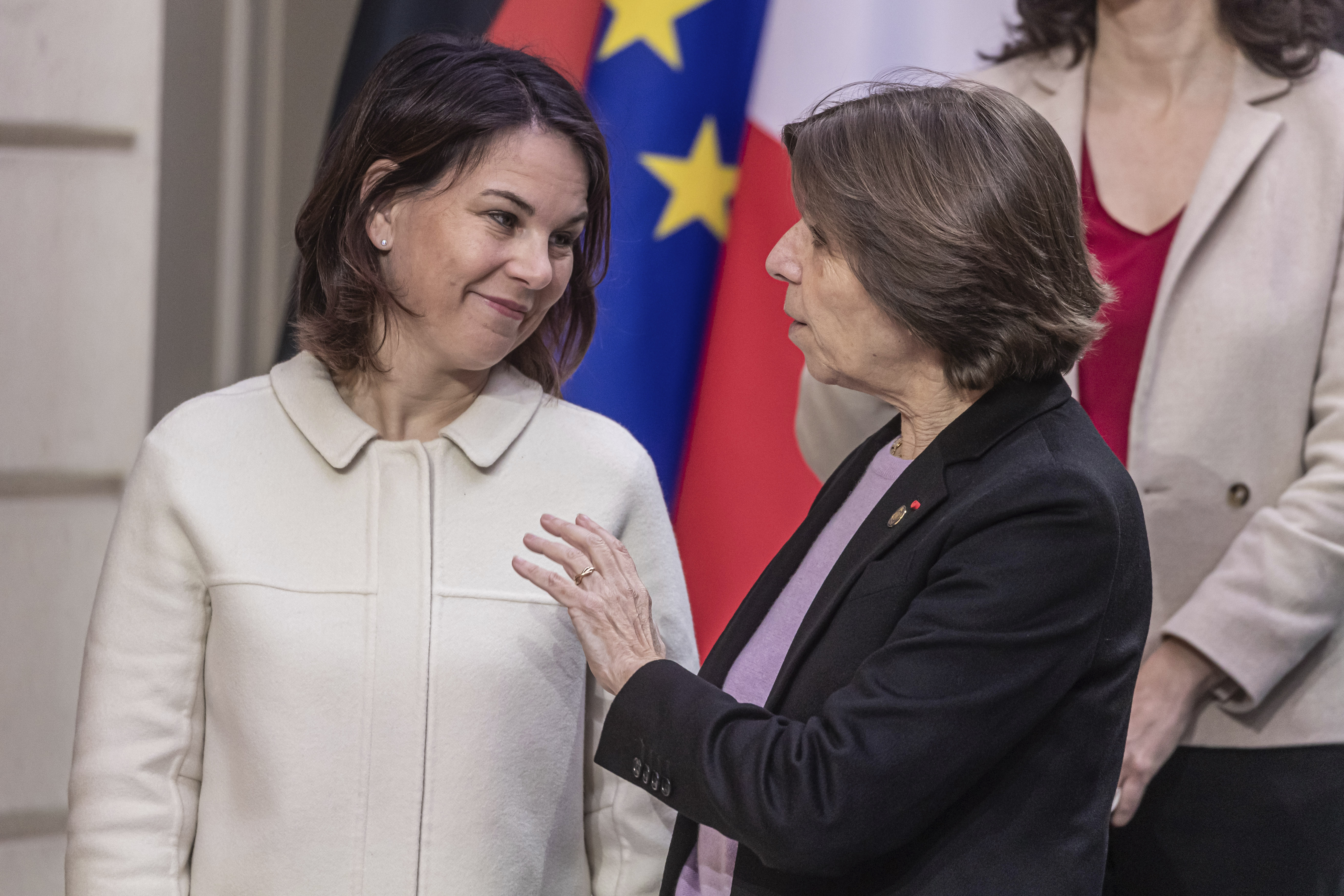 French Foreign Affairs Minister Catherine Colonna, right, speaks with her German counterpart Annalena Baerbock before posing with members of France and Germany cabinets for a group photo ahead of a Franco-German Ministers' council meeting as part of the celebrations marking the 60th anniversary of the Elysee Treaty, at the Elysee Palace in Paris, Sunday, Jan. 22 2023. France and Germany are seeking to overcome differences laid bare by Russia's war in Ukraine and shore up their alliance with a day of ceremonies and talks Sunday on Europe's security, energy and other challenges. (Christophe Petit Tesson, Pool via AP)
French Foreign Affairs Minister Catherine Colonna, right, speaks with her German counterpart Annalena Baerbock before posing with members of France and Germany cabinets for a group photo ahead of a Franco-German Ministers' council meeting as part of the celebrations marking the 60th anniversary of the Elysee Treaty, at the Elysee Palace in Paris, Sunday, Jan. 22 2023. France and Germany are seeking to overcome differences laid bare by Russia's war in Ukraine and shore up their alliance with a day of ceremonies and talks Sunday on Europe's security, energy and other challenges. (Christophe Petit Tesson, Pool via AP) People visit an exhibition of tanks and APCs of Ukrainian armed forces damaged and captured during the fighting at an exhibition at the museum "Breakthrough of the Siege of Leningrad" in Kirovsk, about 30 kilometres (19 miles) east of St. Petersburg, Russia, Sunday, Jan. 22, 2023. (AP Photo/Dmitri Lovetsky)
People visit an exhibition of tanks and APCs of Ukrainian armed forces damaged and captured during the fighting at an exhibition at the museum "Breakthrough of the Siege of Leningrad" in Kirovsk, about 30 kilometres (19 miles) east of St. Petersburg, Russia, Sunday, Jan. 22, 2023. (AP Photo/Dmitri Lovetsky)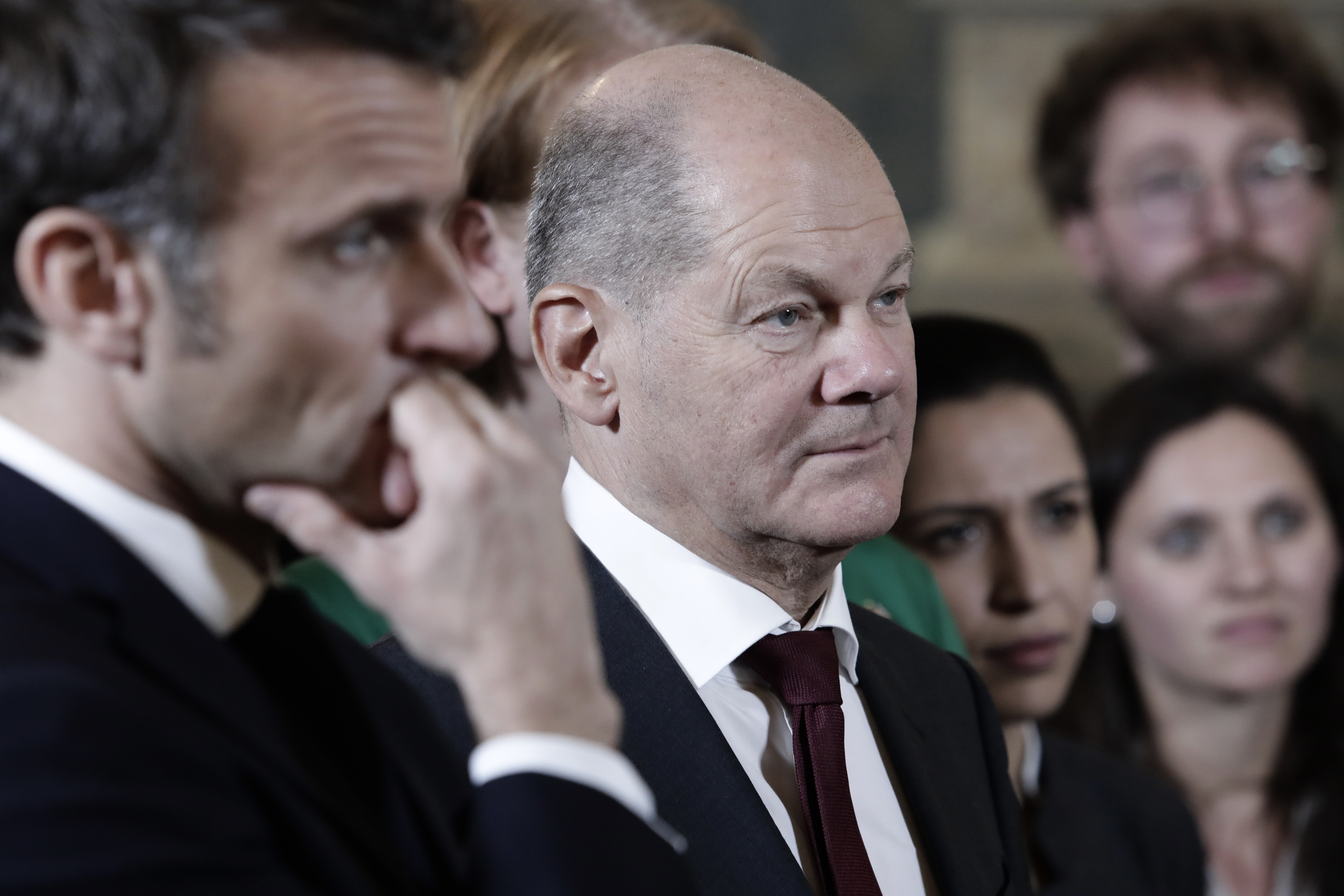 German Chancellor Olaf Scholz, center, and French President Emmanuel Macron listen to Young Talents of Generation Europe Sunday, Jan. 22, 2023 at the Elysee Palace in Paris. France and Germany are seeking to overcome differences laid bare by Russia's war in Ukraine while celebrating their decades-long friendship with a day of ceremonies and talks Sunday on Europe's security, energy and other challenges. (AP Photo/Lewis Joly, Pool)
German Chancellor Olaf Scholz, center, and French President Emmanuel Macron listen to Young Talents of Generation Europe Sunday, Jan. 22, 2023 at the Elysee Palace in Paris. France and Germany are seeking to overcome differences laid bare by Russia's war in Ukraine while celebrating their decades-long friendship with a day of ceremonies and talks Sunday on Europe's security, energy and other challenges. (AP Photo/Lewis Joly, Pool)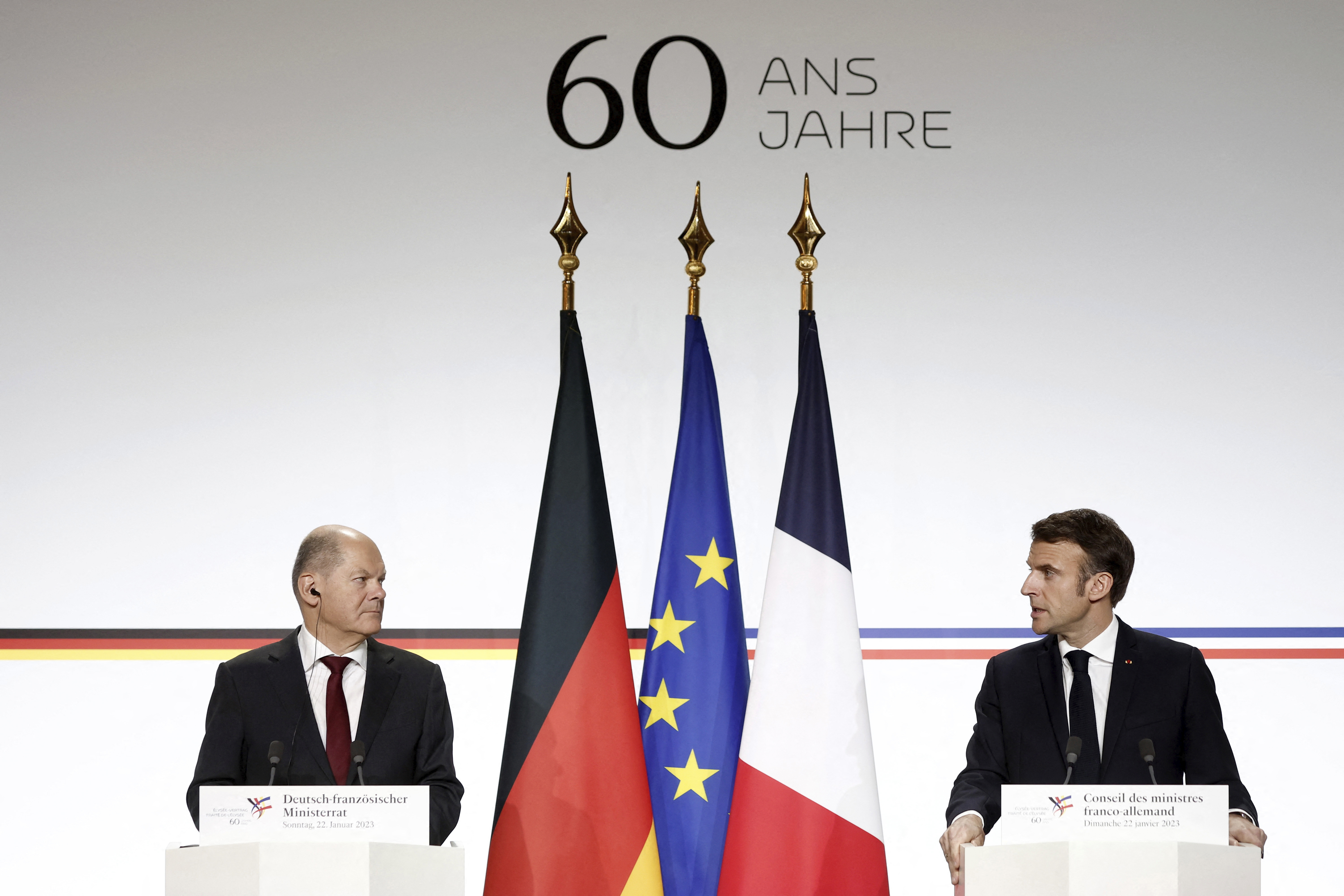 German Chancellor Olaf Scholz, left, and French President Emmanuel Macron attend a joint press conference Sunday, Jan. 22, 2023 at the Elysee Palace in Paris. France and Germany are seeking to overcome differences laid bare by Russia's war in Ukraine and shore up their alliance with a day of ceremonies and talks Sunday on Europe's security, energy and other challenges. (Benoit Tessier, Pool via AP)
German Chancellor Olaf Scholz, left, and French President Emmanuel Macron attend a joint press conference Sunday, Jan. 22, 2023 at the Elysee Palace in Paris. France and Germany are seeking to overcome differences laid bare by Russia's war in Ukraine and shore up their alliance with a day of ceremonies and talks Sunday on Europe's security, energy and other challenges. (Benoit Tessier, Pool via AP)